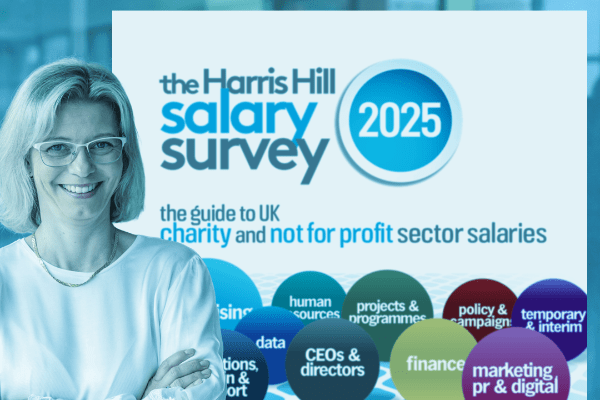After a busy day at work, do you crave the solitude of your own home? During a creative meeting, do you prefer to listen and reflect rather than engage in lively debate? Is downtime essential after a run of team drinks and networking events?
You could be an introvert… and it’s nothing to be ashamed of. For my guest blog this month, I’m exploring why introversion should be celebrated at work, not corrected, and how it can be a powerful trait for accomplishment and contentment.

First, the theory…
The terms introversion and extroversion were popularised by Swiss psychiatrist and psychoanalyst Carl Jung, one of the first to define these characteristics in a psychological context and suggest that we all fall into one of these two categories.
Psychologically speaking, an introvert is someone who is principally concerned with their own thoughts and feelings rather than with external things. Although not necessarily uncomfortable around other people, they prefer not to be the centre of attention. Conversely, extroverts are concerned primarily with the physical and social environment and find being in the spotlight energising and stimulating; it’s when their best qualities shine through.
A quiet extrovert?
How would you describe yourself? I’ve always assumed I was an extrovert as I relate to several of the behavioural traits usually associated with extroversion (such as being sociable, outgoing and people-orientated) and I’m not shy or reticent as the dictionary definition of introversion suggests. When I took theMyers-Briggs Type Indicator assessment at work a few years ago, I wasn’t surprised to see one of my dimensions was ‘E’ for extrovert - I love team working and draw energy from being around others and the external world.
So I’ve been surprised recently to find myself retreating a little. Seeking quiet spaces to think, work and concentrate rather than flinging myself willingly into the open plan office or a busy café if I’m freelancing. I really enjoy social gatherings both in and after work, but I’m drained if my calendar is too jam packed. Although not passive in meetings, lately I’ve also appreciated listening and reflecting before making a point.
So, does this make me low-energy or lacking in resilience? Will people see me as shy (or worse, rude), and will I be overlooked at work or less successful?
Extroverts and introverts in society
If you’re a fan of social media or reality TV, you could be forgiven for thinking that society values the outgoing and gregarious above others, both in and out of the workplace.
As journalist Freya Parr cites in her article for The Huffington Post, these platforms ‘create a culture in which we assume that extroversion is aspirational, because, put simply, if you have an outgoing disposition and get on with others, you’re more likely to win’. (The Apprentice anyone?).
Outside of work, we’re encouraged to amass new friends and followers on our social and professional networks and ‘put ourselves out there’. Yet, 24/7 connectivity or as Viv Groskop says in her article for The Pool, ‘a world of constant connection and chatter and sharing and me me me’ can be kryptonite for introverts.
Introversion at work
In work, it’s not unusual to see the most dominant and confident speakers presenting at the all-company meeting or assigned to a crucial new business pitch. Shyness, sensitivity and seriousness are often seen as negative, and in a culture where being social and outgoing are prized above all else, it can be difficult, even embarrassing, to be an introvert at work.
According to People Management magazine, many of us are hard-wired to associate leadership with extrovert traits, and report that 96 per cent of business leaders identify as extroverts. Arguably, the world’s most important workplaces or institutions are designed or set up with extroverts - and their need for stimulation - in mind with open plan design, group participation and team development days often on the agenda.
Yet, what if you prefer listening to talking, and more intimate discussion to group settings? What if the idea of an open-plan setting fills you with horror, and you find yourself sloping off to a quiet meeting room for peace and concentration?

Making a case for the quietly contemplative
You’re not alone. It’s thought at least a third to half of people are introverts, including some of the world's most talented. Without them we wouldn't have the Apple computer, the theory of relativity and Van Gogh's sunflowers.
One of the most popular TED talks of all-time focuses on the power of introverts. Attorney-turned-author Susan Cain passionately argues that introverts bring extraordinary talents and abilities to the world but have often been misunderstood as shy or, damagingly, inept.
According to Susan, introverts prefer listening to talking and think before they speak.. She believes that although collaboration and interaction are great for exchanging ideas, introverts are most alive and capable in low-key environments and solitude is crucial for unleashing their creativity. Individual introverts view themselves as focused, capable and able to work without distraction.
Executive Leadership Coach Leo Aspden expands on this further in his article for Training Zone, arguing that introverts make great leaders, just as good as their more visible extroverted colleagues. The quietly contemplative possess several leadership qualities such as (a) great listening skills, (b) the ability to make calculated decisions (c) the capability to balance extroverts (d) the ability to work independently in solitude and (e) the tendency to allow colleagues the space and freedom to share ideas. He believes that in order to get the best out of introvert leaders ‘it’s important to embrace their unique brand of charisma and their strengths as listeners and strategic thinkers’.
Finally, Susan suggests that we all fall somewhere in the middle of introversion-extroversion, rather than being neatly one or the other. The American social scientist Kimball Young even created a word for this in 1927; ambivert - ‘a person exhibiting features of an extrovert and an introvert’. So, perhaps it’s time we reconsider the introvert-extrovert dichotomy…
The power of the introvert
So how can you channel introversion (or ambiversion) into success at work and take full advantage of your strengths?
Here are some tips on how to put yourself out there, quietly but powerfully:
► It’s likely you’ve fully prepared before a meeting but if you’re thrown off guard by a question you’re not equipped to answer, don’t panic. Make a note and confidently explain that you’ll follow up after the meeting rather than be pressured into a hasty response. This enables you to think things through in your own time.
► If you work in a bustling open plan office, don’t feel afraid to leave the pack and head for a designated quiet area (or any nook you can find) to give you the thinking space required to work at your best. You’re likely to get more done as a result, and smash the deadline/nail the presentation/concoct the idea.
► At work, even away from the comfort of your own social circle, believe in what you say. Speaking less frequently but with conviction can be hugely powerful. The most engaging person in the room, or the office, isn’t always the loudest.
► If you’ve committed to a networking event, make a plan in advance to ease your nerves. Vikas Shah, CEO and Managing Director of Swiscot Group shares a good strategy; he mingles a bit at the start of the event, stays on for the important talk and then excuses himself. “You don’t have to be the last person standing” he says. “Allowing that flexibility makes a big difference to how you cope.”
The introverts are coming…
It could be the time to join the Quiet Revolution and rethink the idea that it’s a drawback to be an introvert.
In fact, it could be good for you, and for business. Giving yourself time alone to work, think and recharge could increase creativity, make you worker harder and reap tangible results at work.
In the very wise words of (shy introvert) Mahatma Gandhi, “in a gentle way, you can shake the world.”
--------------
Nicola Greenbrook - HR Specialist & Freelance Writer
Contact Nicola
More from Nicola Greenbrook
• How to be productive at work
• How to start a new job...and survive
• Would HR in the charity sector work for you? Here's the inside view
-

Opportunity for all
Find out how we’re working to deliver more diverse, equitable and inclusive recruitment…
-

Recruiting a charity CEO?
Our executive recruitment specialists have an exceptional record of successful CEO, chair, trustee and…
-

Charity sector salaries
Our 2025 Salary Survey has the latest rates and expert insight for roles throughout the sector.













